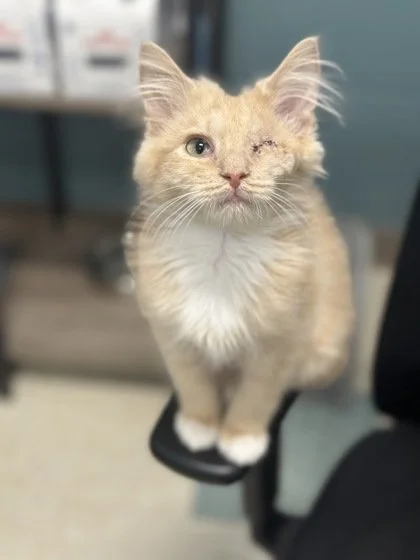Understanding Manx Syndrome in Cats
What is Manx Syndrome?
Manx syndrome is a genetic condition predominantly affecting Manx cats, characterized by the absence or shortening of the tail due to a mutation in the M gene. This mutation leads to abnormal development of the spine, particularly the coccygeal (tail) and sacral vertebrae, and can result in a range of health issues (UFAW).
What causes Manx Syndrome?
Hopscotch, a kitten with manx syndrome, shortly after arriving at RAL at just 1 month old.
Manx syndrome occurs when the genetic mutation that shortens the tail also affects the spinal cord and surrounding structures. The severity varies widely, with some cats experiencing mild symptoms and others facing significant medical challenges. This condition is a form of spina bifida, where the spinal cord may be exposed or improperly developed, leading to neurological issues (PetMD).
Common Symptoms
Neurological Deficits: Some affected cats may have weak or uncoordinated hind limbs, exhibit a wobbly gait, or in severe cases, experience partial paralysis.
Bladder Dysfunction: Many cats with Manx syndrome struggle with urinary incontinence or an inability to fully empty their bladder, requiring manual expression.
Bowel Control Issues: Fecal incontinence is common, as affected cats may pass stool involuntarily due to nerve damage.
Spinal Deformities: Missing or malformed vertebrae can lead to pain, discomfort, or difficulty moving normally.
Digestive Problems: Some cats experience megacolon, a condition where the colon becomes enlarged and unable to pass stool efficiently.
Diagnosing and Managing Manx Syndrome
A veterinarian can diagnose Manx syndrome through physical examination and imaging, such as X-rays or MRI scans, to assess spinal abnormalities. While there is no cure, management strategies focus on maintaining the cat's quality of life through:
Bladder Expression: For cats with urinary retention, manual bladder expression is essential to prevent infections and discomfort.
Sanitary Care: Cats with fecal incontinence benefit from regular hygiene maintenance, including sanitary shaves and gentle cleaning to prevent skin irritation and infection.
Pain Management: If spinal abnormalities cause discomfort, medications or physical therapy may help alleviate symptoms.
Dietary Adjustments: High-fiber diets and stool softeners can aid digestion and prevent constipation or megacolon.
Supportive Living Environment: Providing soft bedding, ramps, and easy access to food and litter boxes can improve mobility and comfort.
Adopting and Caring for a Cat with Manx Syndrome
Hopscotch at 8 months old and just cleared for adoption to a loving home.
Cats with Manx syndrome require dedicated caregivers willing to accommodate their special needs. While their condition can be challenging, they are often affectionate, playful companions who thrive with the right support. Potential adopters should work closely with a veterinarian to learn proper care techniques and ensure their cat remains comfortable and healthy.



